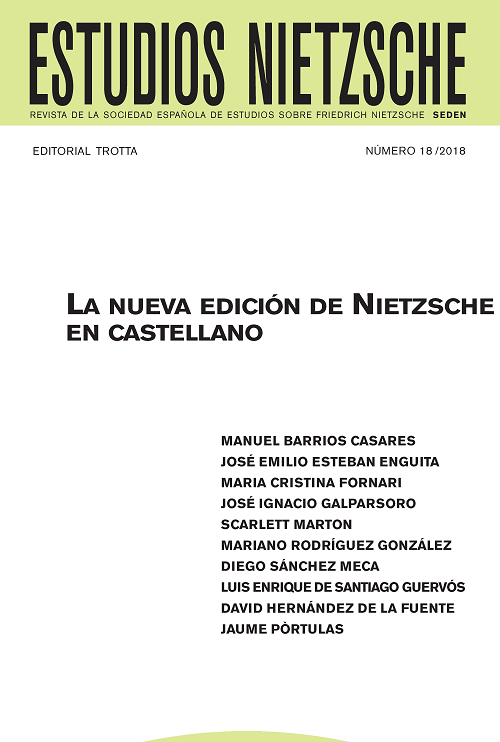Nietzsche: A Decisive Inflection in the Country of Discontinuity
DOI:
https://doi.org/10.24310/EstudiosNIETen.vi18.10866Keywords:
Nietzsche, History of the reception, Critical edition, Hermeneutics, TranslationAbstract
The previous status of the reception of Nietzsche’s work in Spain is reviewed, both in terms of editions and interpretations of his thought. The reasons why the recent editing projects of their Posthumous Fragments and Complete Works are an essential milestone in the consolidation of a specialized research in our country are argued.
Downloads
Metrics
References
AA. VV., En favor de Nietzsche. Madrid: Taurus, 1972.
Ávila Crespo, R., Nietzsche y la redención del azar. Universidad de Granada, 1986.
Bautista Llinares, J. B., Hombre, arte y lenguaje. Una investigación sobre el joven Nietzsche. Valencia: Servei de Publicacions de la Universitat de València, 1982.
E. Burgos, Dioniso en la filosofía del joven Nietzsche. Zaragoza: Prensas Universitarias, 1993. J. E. Esteban, Política y cultura en el pensamiento del joven Nietzsche (1869-1876). Madrid: UAM, 1999; El joven Nietzsche. Política y tragedia. Madrid: Biblioteca Nueva, 2004.
Cano, G., Como un ángel frío. Nietzsche y el cuidado de la libertad. Valencia: Pre-textos, 2000.
Garrido, M., N. Orringer, L. y M. Valdés (coords.), El legado filosófico español e hispanoamericano del siglo XX. Madrid: Cátedra, 2009.
Gonzalo Sobejano, Nietzsche en España, Madrid: Gredos, 1967.
Jesús Conill, El poder de la mentira. Nietzsche y la política de la transvaloración. Madrid: Tecnos, 1997.
I. Hoyos, I., Sobre el amor y el miedo. Tópicos antiguos y enfoques modernos. Madrid: Avarigani, 2016.
Nietzsche, F., Obras Completas, I-IV (OC ). Director ed. Diego Sánchez Meca. Madrid: Tecnos, 2011-2016
Nietzsche, F., Correspondencia I-VI. (CO). Director ed. Luis E. de Santiago Guervós. Madrid : Trotta, 2005- 2012.
Nietzsche, F., Fragmentos Póstumos I-IV (FP). Director ed. Diego Sánchez Meca. Madrid: Tecnos, 2006-2010.
Nietzsche, Friedrich, Werke. Grossoktavausgabe. Leipzig: Kröner, 1905ss. (20 vols).
Nietzsche, F., Werke. Kritische Studienausgabe, ed. de G. Colli y M. Montinari. 15 vols. Berlin: Walter de Gruyter, 1980 (3ª ed. 1999).
Ortega y Gasset, José, Obras Completas. Madrid: Revista de Occidente, 1966, vol. IX, 494.
Henning Ottmann, Nietzsche-Handbuch. Stuttgart: Metzler, 2000. Paul van Tongeren, Gerd Schank y Herman Siemens (eds.), Nietzsche-Wörterbuch. 4 vols., Berlin, De Gruyter, 2001ss. Christian Niemeyer (ed.), Nietzsche-Lexikon. Darmstadt: Wissenschaftliche Buchgesellschaft, 2012.
Quesada, J., Un pensamiento intempestivo. Ontología, estética y política en Nietzsche. Barcelona: Anthropos, 1988.
J. M. Romero, El caos y las formas. Experiencia, conocimiento y verdad en F. Nietzsche. Granada: Comares, 2001.
E. Ruíz, Nietzsche y la filosofía práctica. La moral aristocrática como búsqueda de la salud. Universidad de Granada, 2004.
Sánchez Meca, D., y J. Conill (eds.), Guía Comares de Nietzsche. Granada: Comares, 2014, pp. 285-312.
M. Rodríguez, La teoría nietzscheana del conocimiento. Madrid: Eutelequia, 2010
Diego Sánchez Meca, El itinerario intelectual de Nietzsche. Madrid: Tecnos, 2018.
Sanchez Meca, D., En torno al superhombre. Nietzsche y la crisis de la modernidad. Barcelona: Anthropos, 1989.
Santiago, Luis E. de, «Nietzsche y los límites del lenguaje: la fuerza del instinto», en Id. (ed.), Actualidad de Nietzsche. Universidad de Málaga, 1994; «El poder de la palabra», en Nietzsche, Escritos sobre retórica. Madrid: Trotta, 2000; Arte y poder. Aproximación a la estética de Nietzsche. Madrid: Trotta, 2004.
Savater, Fernando, Conocer Nietzsche y su obra. Barcelona: Dopesa, 1977.
Udo Rukser, Nietzsche in der Hispania. Ein Beitrag zur hispanischen Kultur und Geistesgeschichte. Bern/München: Francke, 1962.
Vázquez García, Francisco, Hijos de Dionisos. Sociogénesis de una vanguardia nietzscheana (1968-1985. Madrid, Biblioteca Nueva, 2014.
Vermal, J. L., La crítica de la metafísica en Nietzsche. Barcelona: Anthropos, 1987.
Downloads
Published
How to Cite
Issue
Section
License
As of issue 21 (2021) this journal is published only in open access (diamond route).
From that number 21, like the previous numbers published in NIETZSCHE STUDIES, they are subject to the Creative Commons Acknowledgment-NoComercia-ShareIgual 4.0 license, the full text of which can be consulted at <http://creativecommons.org/licenses/by-nc-sa/4.0 >
It is the responsibility of the authors to obtain the necessary permissions of the images that are subject to copyright.
This work is licensed under a Creative Commons Attribution-NonCommercial-ShareAlike 4.0 International License.
Copyright generates two different rights: moral rights and patrimonial rights that EJFB recognizes and respects. Moral rights are those relating to the recognition of the authorship. They are rights of a personal nature that are perpetual, inalienable, unseizable and imprescriptible as consequence of the indivisible union of the author and his/her work.
Patrimonial rights are those that can be derived from the reproduction, distribution, adaptation or communication of the work, among others.







11.png)
